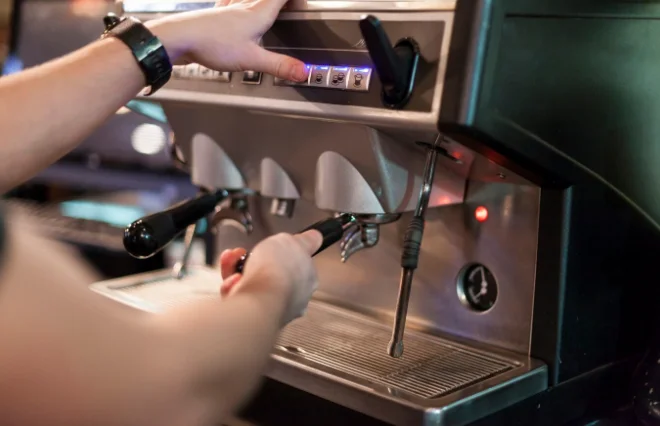Choosing the commercial espresso machine that’s right for your business can feel like balancing art and science. You need a machine that not only delivers cafe‑quality espresso but also fits your workflow, budget, and customer expectations. In this deep dive, we’ll explore the key qualities that separate good from great and help you land on the Best espresso machine for business use.
The Role of Reliability and Build Quality
This is the role of reliability and build quality in commercial espresso machines:
Durability that stands up to high volume
A café or restaurant demands equipment that can handle dozens (if not hundreds) of shots daily. The best machines are built with commercial‑grade components—stainless steel boilers, brass group heads, and rugged frames—to withstand constant use without compromising performance.
Consistency in shot quality
No one wants their espresso to vary from shot to shot. Precise temperature control and stable pressure ensure every extraction is balanced. Features like PID controllers and dual boilers play a huge role in maintaining that consistency during back‑to‑back service.
Ease of maintenance
Commercial machines must be easy to clean and service. Removable parts, accessible service panels, and clear prompts for descaling or filter changes reduce downtime and make upkeep straightforward, even for café owners without a full-time technician.
Power, Performance, and Workflow Integration
Let us have a look at the standard power, performance, and workflow integration features of these machines:
Throughput and speed
A great machine isn’t just correct—it’s fast. Look for models that have fast heat-up times and can recover heat quickly between shots. This helps baristas keep pace during the morning rush or busy lunch hours.
Smart features for streamlined service
Modern commercial machines often include programmable shot volumes, pre-infusion settings, and auto-clean cycles. These features cut down on training time and help maintain quality even under pressure.
User-friendly interface
Clear, intuitive controls matter. Whether electronic displays or analog switches, the machine should make sense to baristas at every experience level—no complex sequences, just clear prompts and visible status indicators.
Cost Efficiency and Total Cost of Ownership
About cost efficiency and total cost of ownership:
Upfront investment vs. long-term value
Initial cost matters, but a lower-priced machine may cost more in repairs or energy use. Consider the lifespan, warranty, and availability of parts when calculating your ROI.
Energy efficiency and sustainability
Energy-efficient machines not only reduce electricity bills, but they also demonstrate that your business values sustainability. ENERGY STAR certification is a notable indicator; similar appliances, such as ovens, offer around 30% energy savings compared to certified models.
Service access and local support
Machines backed by reliable local service save you stress and money. When parts are near and technicians respond fast, you avoid disruptions during critical business hours.
How Drink Quality and Customization Drive Choice
Understanding what your customers want shapes the machine you choose. A busy coffee bar serving multiple beverages might prioritize speed and automation, while a boutique café might lean toward manual control and pressure profiling for specialty pours.
Understanding customer preferences and volume
In the U.S., traditional coffee still accounts for the majority of coffee sales, while espresso-based drinks, such as cappuccinos, lattes, and Americanos, make up the remainder. That shows a balanced audience: cafés need machines that perform for both high‑volume drip and crafted espresso drinks.
Balancing manual control vs. automation
Manual machines give baristas creative freedom. Automated machines deliver consistency and ease, perfect for high‑traffic environments or teams with varying skill levels. Many top commercial models offer hybrid modes: program one profile for busy hours, and enable manual tweaks for slower service or specialty drinks.
Steam power and milk pairing
Suppose you serve milk drinks, steam power matters. Double boiler machines separate brewing and steaming, so neither process compromises the other. A steamer with high volumetric output and quality wand design ensures those velvety milk textures customers love.
Workflow, Integration, and Space Planning
Your coffee machine must suit more than just drink production—it needs to fit into your entire café ecosystem.
Workflow smoothness behind the bar
Machine placement next to grinders, knock boxes, and tap bins indicates a well-designed bar. There’s no one-size-fits-all layout, but ensuring the shot path aligns with your serving area and cleaning station reduces wasted steps and keeps lines moving smoothly.
Compatible with grinders and water systems
A quality espresso machine is only as good as its support systems. Ensure your grinder matches the machine’s dose and speed. Additionally, installing a water filtration system isn’t optional—it keeps espresso tasting clean and prevents scale buildup that damages equipment.
Scalable for growth
Plan for space and future service peaks. If you expect to add seats or expand offers, buying a dual group or a modular machine now can save you from needing an entirely new setup later.
Support, Training, and Warranties
Even the best machine can become a headache without proper support. Prioritize vendors who stand by your side long after the sale.
Warranty coverage and spare parts
Look for warranties that cover labor, parts, and control boards—not just the boiler. Verify that replacement parts are stocked locally or regionally and that turnaround times are reasonable.
Training and onboarding support
Does your supplier offer training for baristas and maintenance staff? Machines loaded with features can lose performance if your team doesn’t know how to use them effectively. Training from the vendor helps speed up service and reduces errors.
Accessibility of technical support
Support availability—whether by phone or online—is essential. A barista who has burned out a machine due to a calibration error needs help fast. Quick troubleshooting support avoids extended shutdowns and keeps revenue flowing.
Investing in the Best Espresso Machine for Business Results
When you weigh these factors—reliability, performance, drink quality, workflow, and support—you’ll zero in on what makes the Best espresso machine for business your investment. The right machine won’t just make shots: it’ll support your barista, delight your customers, and build your brand’s reputation every day.
Choosing any commercial espresso machine involves trade‑offs. It’s the job of a true expert to match features with your business goals, such as speed, customization, sustainability, or upscale presentation. Step back and determine which keys to productivity matter most for your audience—and then find a machine that fits those needs.
Aligning features with brand identity
A busy office café may require programmable simplicity and self-serve reliability, while a craft coffee bar may prefer manual pressure profiling and visible components that add authenticity. Choose a machine that mirrors your story.
Considering lifecycle and serviceability
A machine that’s easy to disassemble and clean—and integrates service reminders—stretches your dollar further. Preventive maintenance pays off in fewer breakdowns and longer product lifespan.
Investing in people
Even the most advanced commercial espresso machine performs better in the hands of a trained team. Complement equipment investment with staff training, incentives, and checklists to maintain standards, and those small details create significant customer loyalty.
Conclusion
The commercial espresso machine you choose reflects far more than brewing ability. It signals your brand’s identity, supports your workflow, safeguards profits, and retains your staff. The best investment balances shot quality, speed, energy use, serviceability, and vendor support. With these considerations in hand, you won’t just buy a machine, you’ll invest in an asset that scales with your success.
Pro Coffee Gear partners with businesses to provide expert product selection, support, and service, helping you find and maintain the machine that fits your vision.






